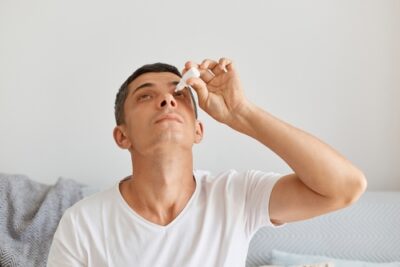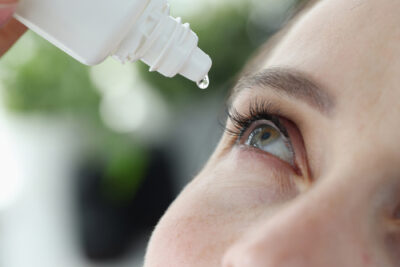Do your eyes often feel irritated when you wear contact lenses? Do they sometimes feel dry even after you take your contact lenses out?

If so, you may have contact lens-induced dry eye. Contact lenses can dry your eyes out because they inhibit oxygen from reaching your cornea, and they also absorb tears from the surface of your eye.
Most modern contact lenses are designed to minimize drying side effects, but some people are still predisposed to contact lens-induced dry eye. But how can you tell if your contact lenses are drying out your eyes?
Keep reading to learn five signs that contact lenses are causing your dry eyes!
1. Inflamed Eyes
The primary symptom of dry eye is inflammation. Inflammation of the conjunctiva, which is the lining on the outside of your eye and eyelids, often feels like burning.
Your eyes may also appear red, especially around the edges. When your eyes are inflamed, they may also feel a little itchy, although itchiness isn’t one of the main symptoms.
If your eyes are inflamed and itchy but don’t feel like they’re burning, you may have allergic conjunctivitis. Contact lenses can also exacerbate allergy symptoms because allergens, especially pollen, can get stuck to the lenses.
If you’re suffering from dry eyes, your eyes will feel less itchy, although you may experience allergic conjunctivitis and dry eye at the same time.

2. Light Sensitivity
If you find yourself squinting a lot and avoiding light because it makes your eyes uncomfortable, it may be due to dry eyes. When your contact lenses dry out your eyes, your eyes lack an adequate tear film.
A healthy tear film moisturizes your cornea and protects your eyes from foreign bacteria and other contaminants. Without that protection, even light can cause discomfort.
3. Blurry Vision
You may have blurry vision for a number of reasons if you have contact lens-induced dry eye. For one, your eyes may water more.
It may sound counterintuitive, but when irritated, your eyes produce reflexive tears, which are different from the tears that compose the tear film that keeps your eyes healthy. Tearing can make your vision blurry.
Your vision may also be blurry because your eyes are irritated, and you have to strain to see. Furthermore, when the surface of your eyes are dry, it can make it difficult for your eyes to focus light appropriately.
All these issues can compound, making it very hard to see at all.
4. Stinging
Inflammation can cause your eyes to burn and sting. You may also occasionally feel like there’s something in your eye.
When you get something in your eye, like an eyelash, it often causes a stinging sensation until it is removed. When you have dry eyes, you may experience a similar sensation due to an unstable tear film.
These symptoms are very common for those with dry eyes.
5. Eye Fatigue
With all these symptoms, you can struggle to use your eyes at all. You may also have trouble even keeping your eyes open. If you experience this type of symptom, it’s likely your eyes are fatigued.
Eye fatigue is often a secondary symptom of dry eye that’s caused by continual discomfort.

What Can You Do?
If you wear contact lenses and you experience all these symptoms, you may very well have contact lens-induced dry eye. Luckily, there are easy ways you can treat your dry eyes without necessarily having to get rid of contact lenses altogether:
Take A Break
When you first experience these symptoms, it’s best to stop using your contact lenses until you can see your eye doctor to have the issue addressed. Your eye doctor may recommend you stop wearing your contact lenses until your symptoms are treated.
Use Eye Drops

Over-the-counter lubricating eye drops, also called artificial tears, can give you immediate dry eye relief. Talk to your eye doctor about using artificial tears.
If your symptoms persist, they may recommend additional treatment.
Try Nutritional Supplements
Talk to your doctor before making any significant changes to your diet, but certain nutrients can aid in tear production. Omega-3 fatty acids are especially vital in producing healthy tears.
You can take Omega-3 in fish oil or flaxseed oil pills, but it’s always more effective to get nutrients from food directly. Eating plenty of fish, walnuts, and seeds may help ease your dry eye symptoms over time.
Change Contact Lenses
If you use weekly or monthly contact lenses, talk to your eye doctor about switching to dailies. Daily contacts retain moisture better than contacts that are used over a more extended period of time.
There are also different kinds of lenses that are made from material that’s more permeable and will allow your eyes to get more oxygen and moisture. Ask your eye doctor what kind of lens is best for sensitive eyes.
Consider Vision Correction Surgery
Although advanced dry eye syndrome will affect your candidacy for laser vision correction procedures, like LASIK, if your symptoms are strictly a result of contact lenses, vision correction may be a good option for you! If you are interested in reducing your dependence on glasses and contact lenses, schedule LASIK consultation at Sugiki Portis in Honolulu, Hawaii, to determine if you may be a candidate!
Do you want to get to the bottom of your dry eye symptoms? Schedule an appointment at Sugiki Portis Eye Center in Honolulu, HI, today!





